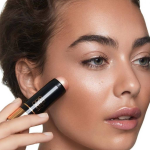Microneedling, a minimally invasive skin rejuvenation process, has become a cornerstone in modern skincare routines. Drawing on the body’s own healing mechanisms, this procedure, also known as collagen induction therapy, promises a transformative journey with benefits readily apparent before and after treatment. In essence, microneedling stimulates natural collagen production to diminish the signs of aging, improve skin texture, and promote an overall youthful complexion. This article delves into the profound advantages of this technique, unveiling the potential for enhanced skin health and beauty that lies just beneath the surface.
Introduction to Microneedling and Its Rising Popularity

Microneedling is an aesthetic procedure that strategically injures the skin with fine, short needles to prompt regrowth and renewal. This innovative approach harnesses the skin’s innate ability to repair itself, leading to a proliferation of collagen and elastin – the building blocks of smooth, firm skin. Pioneered as an anti-aging treatment, microneedling’s versatile capabilities have made it an attractive option for various skin conditions, catapulting it to a favored spot in beauty regimens around the globe.
Understanding Microneedling: The Basics

At its core, microneedling involves a device outfitted with numerous tiny needles that create micro-injuries in the skin. These controlled wounds jumpstart the body’s natural healing processes, chiefly the production of new collagen fibers, leading to stronger and more resilient skin. The procedure is not one-size-fits-all; practitioners may use different devices, such as dermarollers or pen-like tools, adjusted to the unique needs of the individual’s skin concern.
Preparing for Your Microneedling Session: Before Care Tips
- Select a board-certified dermatologist or licensed skincare professional trained in microneedling.
- Refrain from using retinoids and chemical exfoliants a week before your session to avoid undue irritation.
- Ensure your skin is clean and free of any makeup or lotion on the day of the treatment.
These preparatory steps are crucial for a smooth procedure with optimal outcomes. Additionally, managing expectations through a detailed discussion with your provider will help tailor the treatment plan to best address your concerns.
Immediate Microneedling Benefits: The Afterglow
Following a microneedling session, patients often notice an afterglow – a temporary radiance due to the increased blood flow to the face. As the micro-wounds heal, they absorb skincare products more efficiently, allowing active ingredients to penetrate deeply and work effectively. Post-procedure, it’s instrumental to adhere to your clinician’s aftercare advice, which usually includes hydrating serums and sun protection, to preserve and enhance the treatment’s benefits.
Long-Term Benefits of Microneedling: From Healing to Renewal
The true success of microneedling lies in the cumulative effect of treatments over time. With successive sessions, the skin’s texture becomes smoother, and issues like acne scars, fine lines, and enlarged pores visibly improve. The ongoing boost in collagen synthesis yields significant, durable results that radiate natural beauty from within.
Before and After Microneedling: What the Evidence Shows
To substantiate the efficacy of microneedling, numerous before-and-after studies have chronicled its impact on various skin conditions. These documented cases serve as a testament to microneedling’s versatility and effectiveness, with dermatologists advocating its use as a substantial part of a holistic skincare strategy.
| Condition | Improvement (%) | Treatment Sessions |
|---|---|---|
| Acne Scars | 50-70 | 4-6 |
| Hyperpigmentation | 40-60 | 4-6 |
| Fine Lines and Wrinkles | 40-80 | 4-8 |
Combating Acne Scars and Skin Texture
Acne scars, notoriously stubborn and difficult to treat, have met their match in microneedling. By disrupting old collagen and fostering new growth, the indented textures of scarring smooth over time. Patients typically notice a marked difference in both the feel and appearance of their skin, with scars becoming less pronounced and the overall surface becoming more uniform.
Wrinkle Reduction and Skin Tightening Effects
As we age, the battle against fine lines and wrinkles becomes increasingly challenging. Microneedling steps into this fray by tightening loose skin and reducing wrinkle depth. Over the course of treatments, skin not only feels firmer but also appears revitalized, shedding years off one’s complexion.
Pigmentation Concerns and Microneedling Efficacy
For those grappling with uneven skin tone, microneedling offers a beacon of hope. It’s recognized for its potential to mitigate the effects of hyperpigmentation and melasma, conditions often exacerbated by the sun and hormonal changes. Achieving an even complexion becomes an attainable goal with the help of this promising procedure.
Potential Side Effects and Aftercare Considerations
While microneedling is deemed safe for most individuals, side effects such as redness, swelling, and bruising might occur. These reactions are typically short-lived and can be eased with proper aftercare. Maintaining a gentle skincare routine post-treatment and avoiding sun exposure are pivotal in mitigating side effects and ensuring a smooth recovery.
Microneedling Treatment Course: What to Expect
Embarking on a microneedling treatment plan is a commitment to one’s skin health. The process, usually spread over several months, involves multiple sessions with intervals of healing in between. The exact course will vary based on the skin’s condition and the sought-after results, but consistently following the outlined regimen is key to achieving the full benefits of microneedling.
Conclusion: Embracing The Transformation With Microneedling
In conclusion, microneedling presents a minimally invasive solution with the power to transcend surface-level skincare. Through its collagen-inducing capabilities, it provides a slew of benefits, both immediately visible and progressively realized over time. While the prospect of undergoing the procedure may seem daunting to some, the potential to unveil a more radiant, youthful complexion lies within reach. As with any cosmetic treatment, consulting with a trusted professional will help personalize your microneedling journey to best fit your individual needs.
FAQs After Conclusion
- Q1: How long does it take to see results from microneedling?
- A1: Immediate results, such as enhanced glow, can often be observed shortly after treatment, with more significant outcomes, like improved skin texture and reduced fine lines, typically becoming evident after several sessions, around 4-6 weeks following the start of treatment.
- Q2: Is microneedling painful?
- A2: While discomfort levels vary, microneedling isn’t generally painful due to the application of a topical anesthetic before the procedure. Any discomfort experienced is usually well-tolerated by patients.
- Q3: Can microneedling cause scarring?
- A3: Scarring from microneedling is rare when performed by a qualified professional. On the contrary, the treatment is more commonly associated with the reduction of scar appearance over time.
- Q4: How often can you safely have microneedling done?
- A4: Safe practice generally dictates treatment intervals of 4 to 6 weeks. This allows for full skin recovery and collagen development between sessions.
- Q5: Is there anyone who should not undergo microneedling treatments?
- A5: Individuals with active skin infections, chronic skin conditions, or severe acne should avoid microneedling. Those who are pregnant or prone to keloids should seek medical advice before proceeding with the treatment.


